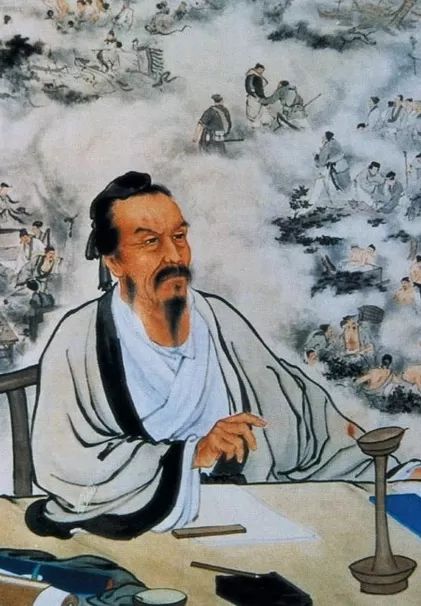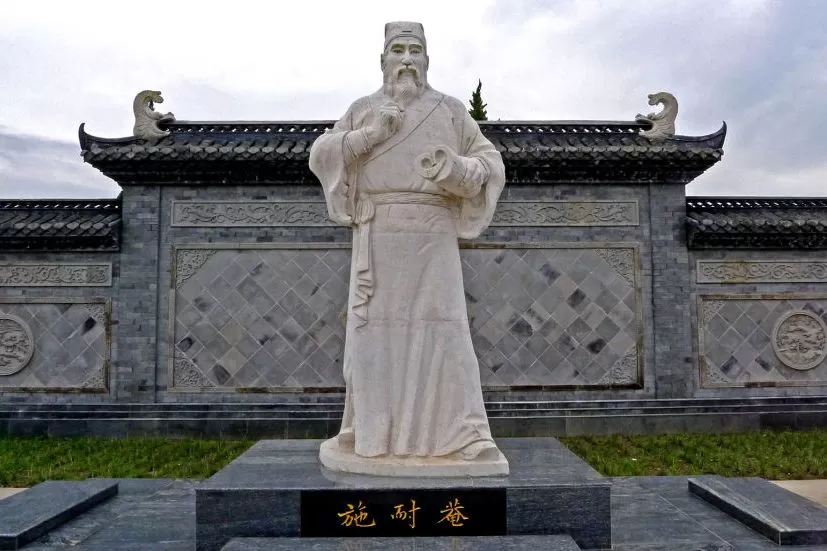
Shi Nai'an (c. 1296–c. 1370), originally named Shi Er, with the courtesy name Zhaorui and pseudonym Zi'an, also known by his literary name Nai'an, was born in Xinghua, Jiangsu (present-day Baiju Town, Dafeng District, Yancheng). His ancestral home was in Suzhou, though he later moved to Huai'an. Some sources suggest his ancestral roots were in Huai'an, and that he resided in Hangzhou before returning to his hometown. A renowned writer during the transition from the Yuan to Ming dynasties, he is best known as the author of Water Margin (Shuǐhǔ Zhuàn).
Shi Nai'an displayed remarkable intelligence and diligence from a young age. He earned the title of Xiucai (a scholar candidate) in 1314 during the Yuan Dynasty, became a Juren (provincial graduate) in 1324, and attained the Jinshi (metropolitan graduate) degree in 1331. Shortly after, he served as the Magistrate of Qiantang County but resigned after being reprimanded by superiors for defending the poor against injustices. In 1353, he joined salt workers, including Zhang Shicheng, in an uprising against the Yuan regime. Disillusioned by Zhang Shicheng's arrogance, Shi left Pingjiang and wandered the country, healing and assisting people. Later, he became a private tutor in the household of Xu Qi, a wealthy man in Zhutang, Jiangyin. There, alongside teaching, he dedicated himself to literary creation. In 1367, Shi traveled north to Baiju by the coast, where he lived in seclusion and focused on writing. He passed away in Huai'an in 1370.
Shi Nai'an's Water Margin is one of China's Four Great Classical Novels. It masterfully weaves together folk tales of the Liangshan Mountain rebels, reflecting the people's historical perspectives and moral judgments while expressing the author's admiration for the uprising peasants. Upon its publication, the novel gained immense popularity. Shi Nai'an possessed not only profound life experience but also exceptional artistic talent. His work holds significant importance for the development of Chinese full-length fiction and has contributed a precious treasure to both Chinese and world literature.
| alias | Shi Zhaorui, Shi Yanduan |
| character | Zhao Rui |
| name | Zi'an |
| The era in which it is located | At the end of the Yuan Dynasty and the beginning of the Ming Dynasty |
| Ethnic groups | the Han nationality |
| birthplace | Xinghua, Jiangsu |
| Date of Birth: | In the second year of Yuanzhen (1296) |
| date of death | In the third year of Hongwu (1370) |
| The place of death | Huai'an, Jiangsu |
| Main achievements | Write 'Water Margin' |
| Main works | All Men Are Brothers |
| My real name | Shi Nai'an |
| student | Luo Guanzhong |
Shi Nai'an, born in Baiju Field, Taizhou (now part of Dafeng) during the late Yuan and early Ming dynasties, relocated to Xinghua to escape war and live in seclusion. He was a fellow townsman of Zhang Shicheng, a leader of the late Yuan peasant uprising. By the mid-Ming dynasty, Baiju (a town) had been successively administered by Xinghua County, Dongtai County, and Yancheng County, while its salt industry management fell under Taizhou and Huai'an.
Shi Nai'an was originally named Yan Duan, with the courtesy name Zi'an. He was born in the Year of the Monkey. His father, Shi Yuan De, courtesy name Changqing, and his mother, Bian Shuzhen, belonged to the same Bian clan lineage that migrated from Suzhou's Fengqiao to Biancang, Yancheng. Shi Nai'an's ancestral home was Shijia Lane outside Suzhou's Chang Gate. His ancestors had moved from Wuxing (Huzhou) to Suzhou as officials during the Tang dynasty, making Shi the 15th-generation descendant. The family later settled in Baiju Field.
Baiju, situated in the lower reaches of the Lixia River, featured a labyrinth of waterways. Shi's father worked as a boatman and was locally known as "the Ferryman." Shi Nai'an had two younger brothers: Yanming (second) and Yancai (third). From childhood, he displayed exceptional intelligence and diligence. As he grew older, he frequently traveled with his father across their hometown, Jiangnan, and Huaibei, broadening his horizons.
According to folklore, when Zhang Shicheng rebelled against the Yuan dynasty and proclaimed himself "King of Wu" in Pingjiang (Suzhou), he appointed Shi Nai'an as military advisor. After Zhang surrendered to the Yuan, Shi repeatedly advised against it to no avail, leading him to abandon his post. He then became a tutor at Donglin Temple in Zhutang, Jiangyin.
When Zhu Yuanzhang besieged Pingjiang, the conflict spread to Jiangyin. Shi recalled his friend Gu Ti—who had served as Tongzhi (deputy prefect) of Songjiang and Jiaxing—and learned Gu was from Xinghua, a secluded region surrounded by water. Known as "Zhaoyang" (Xinghua's ancient name), the area had a reputation as an ideal refuge during wars. Shi sent Gu Ti a letter with an attached poem:
Fleeing the world's strife, I roam under the sky,
Seeking shelter on sunlit shores where peace may lie.
Gu Ti promptly replied, welcoming Shi to Xinghua. His response included a poem:
You journeyed from the south to seek refuge here,
With smiles, we greet an old friend ever dear.
This land is no peach grove of fabled grace,
Yet where else hides a haven from Qin's cruel reign?
After receiving the letter, Shi left his younger brother Yanming in Suzhou and traveled north across the river with his second wife Lady Shen, brother Yancai, and disciple Luo Guanzhong. They first stayed temporarily at Gu Ti's home in Xinghua, then with Gu's assistance, acquired land and property in the sparsely populated coastal area of Baiju Field east of Xinghua. Here, Shi lived in seclusion and authored Water Margin.
During the Hongwu era of the early Ming dynasty, Xu Qi (9th-generation descendant of the Wucheng Xu clan and great-grandfather of Xu Xiake) gained fame as a commoner appointed as envoy to Sichuan. After completing his mission, he resigned and returned home. Xu Qi invited the recluse Shi Nai'an (said to be from Suzhou or Hangzhou) to serve as a private tutor in his household.
Preserved Historical Materials:
Few records detail Shi Nai'an's life, and existing accounts contain discrepancies. He is described as a native of Suzhou who later moved to Huai'an; a Jinshi (metropolitan graduate) of 1331; a former Qiantang official who resigned after disagreeing with the powerful; and a descendant of Shi Zhichang—renowned from youth for his talent and sense of justice.
Since the 1920s, materials related to Shi Nai'an—including the Genealogy of the Shi Clan and Chronicle of the Shi Eldest Lineage—have been discovered in Xinghua, Dafeng, and Yandu (Jiangsu). The Supplementary Annals of Xinghua County includes:
Volume 13: Biography of Shi Nai'an
Volume 14: Epitaph of Shi Nai'an by Wang Daosheng (early Ming period).
While teaching and writing his book, Shi Nai'an was once working on a chapter of Water Margin where the character Shi Xiu outwits and kills Pei Ruhai, while an ascetic monk strikes a wooden fish. Suddenly, he recalled the meticulously preserved wooden fish and mallet in Donglin Temple. Puzzled, he asked Xu Qi: "Why are these temple instruments treasured like precious relics?"
Xu Qi explained: "An elderly monk once resided here. He chanted scriptures and worshipped the Buddha with utmost devotion, striking the wooden fish as he recited." Pointing to the worn depression on the fish, he added: "See this? It reminds us that scholarship demands unwavering focus."
Shi Nai'an nodded thoughtfully. "We writers," he reflected, "must embrace that same perseverance." Inspired, he wrote the characters "耐庵" (Nài Ān) and affixed them to his doorframe—a personal vow to overcome all obstacles in completing Water Margin.
Unaware of its meaning, others began addressing him as "Mr. Nai'an." Over time, he grew fond of the name and formally adopted it as his own: Shi Nai'an.
Shi Nai'an earned the title of Xiucai (scholar candidate) at age 19, became a Juren (provincial graduate) at 28, and attained Jinshi (metropolitan graduate) status at 36—passing the imperial examination alongside Liu Bowen.
After serving as an official in Qiantang (present-day Hangzhou, Zhejiang) for three years, he resigned, disillusioned by the corruption of the bureaucracy and unwilling to flatter the powerful. When Zhang Shicheng rebelled against the Yuan dynasty, Shi joined his military campaign. After Zhang established his base in Suzhou, Shi became his strategic advisor and formed a close friendship with Bian Yuanheng, one of Zhang’s generals.
Historical records about Shi remain scarce and often contradictory. While some sources clearly identify him as a native of Hangzhou—or at least a long-term resident—others speculate he may have been a professional scriptwriter for storytellers or a skilled storyteller himself with basic literary training. Living during the Yuan-Ming transition, he retreated to his ancestral hometown, dedicating himself to writing. Some accounts suggest his friendship with Zhang Shicheng originated through Bian Yuanheng. Ming scholar Hu Yinglin noted in Shaoshi Mountain Studio Notes: "The Water Margin compiled by Shi of Hangzhou gained extraordinary popularity." Modern scholars unanimously recognize Shi as the author, though some argue his disciple Luo Guanzhong co-authored or completed the work.
Despite limited historical traces, Shi Nai'an’s existence is confirmed. After the Ming dynasty’s founding, Zhu Yuanzhang summoned him to serve as an advisor, but Shi repeatedly declined. According to legend, Zhang Shicheng once visited him personally and found him writing Tales of Riverlake Heroes—later known as Water Margin. Following Zhang’s defeat, Shi moved his family to Huai’an to avoid persecution. There he continued writing, leaving behind works like Farewell on the Autumn River and poems dedicated to Gu Ti and Liu Liang.
During Zhang Shicheng’s rebellion, Shi participated in military operations. As Zhang’s advisor in Suzhou, he grew disillusioned by Zhang’s indulgence in luxury and rejection of loyal counsel. Along with Lu Yuan, Liu Liang, and Chen Ji, Shi left in disappointment. Upon parting from Lu and Liu, he composed the suite Farewell on the Autumn River, channeling grief and indignation. After Zhang’s downfall, Shi wandered through Shandong and Henan, befriending Liu Shanben, an instructor in Yuncheng County. He later settled in Jiangyin as a tutor for the Xu family before returning to Baiju in seclusion.
Lamenting the corrupt regime, he channeled his ideals into Water Margin and collaborated with Luo Guanzhong on Romance of the Three Kingdoms and The Sorcerer’s Revolt. Though skilled in poetry and song, few of his verses survive beyond Farewell on the Autumn River and poems for Gu Ti and Liu Liang. To evade Ming court summons, Shi lived covertly in Huai’an until his death at 75. Decades later, his grandson Shi Wenyu relocated his remains to Shijiaqiao Village (present-day Xinghua), commissioning the epitaph by Wang Daosheng.
Historical Documentation:
Gao Ru’s Bibliographic Records of a Hundred Rivers states: "Loyalty and Righteousness: The Water Margin—100 volumes. Based on Shi Nai’an’s original version from Qiantang, compiled by Luo Guanzhong." Lang Ying noted in his 1566 Revised Drafts: "This book is Shi Nai’an’s authentic work. He passed away shortly after completing it, yet Water Margin lives on through generations!"

Provides The Most Comprehensive English Versions Of Chinese Classical Novels And Classic Books Online Reading.
Copyright © 2025 Chinese-Novels.com All Rights Reserved
